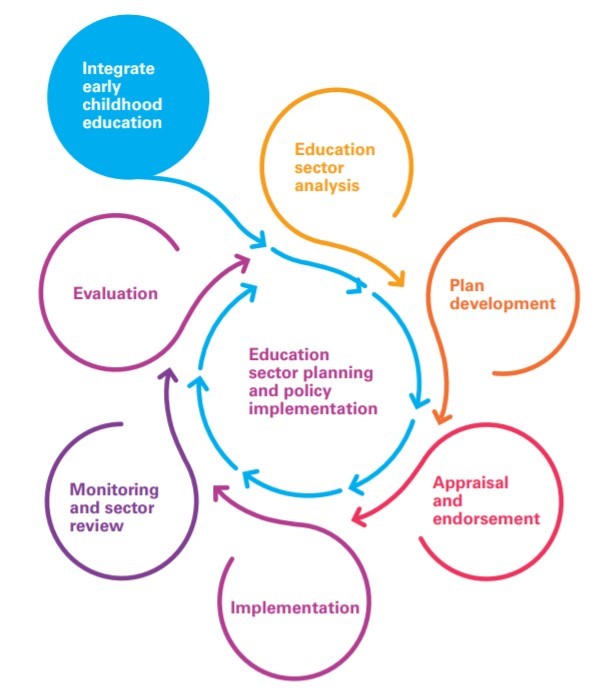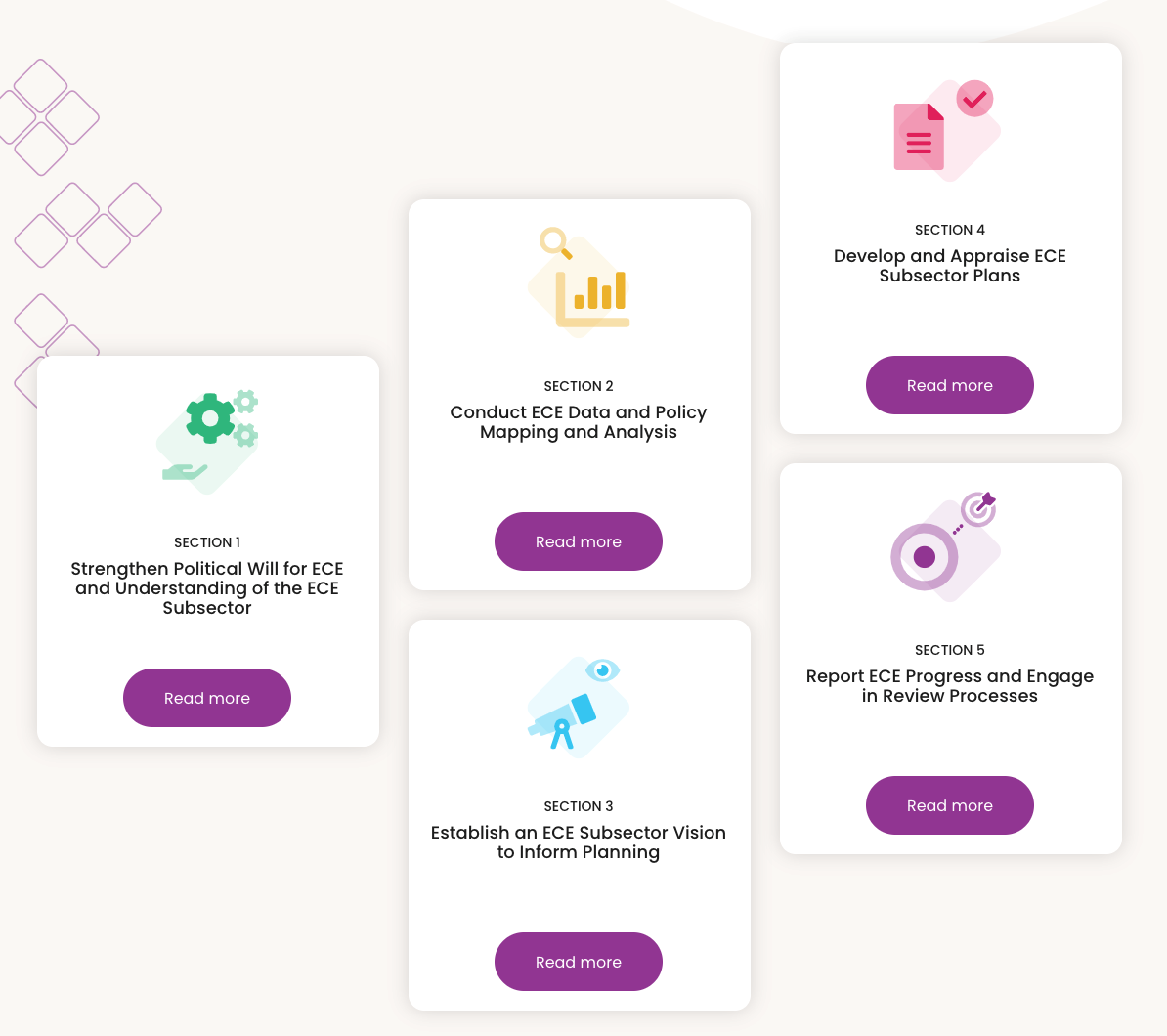
Despite the documented economic and social benefits of early childhood education (ECE), it is still mostly found on the margins of the general education landscape. While SDG 4.2 recognizes the importance of early learning in the global development agenda, COVID-19 has led to prolonged closures, few avenues for remote learning or parental support, and low priority on reopening and making up for the learning losses incurred at the pre-primary level by national governments. These factors have further exacerbated existing inequalities in access to ECE services, especially for the most marginalized and vulnerable young children.
A Systems Approach to Pre-Primary Education
Reaching universal access to quality pre-primary education requires systems-level solutions with sustainability and capacity development at their heart. In order to achieve SDG 4.2, governments need to make a major shift from a piece-meal approach to integrating ECE in their general education policies, plans and budgets. The KIX-funded project, Integrating Early Child Education in Sectoral Planning, undertaken by UNICEF with support from the Global Partnership for Education (GPE) and the International Development Research Centre (IDRC) helps governments to do just that by integrating ECE at scale through Education Sector Plans (ESPs) and their implementation.
Better Early Learning and Development at Scale (BELDS) Approach and the ECE Accelerator Toolkit

Figure 1: Integrating ECE in the ESP Processes
The BELDS Approach supports countries to integrate ECE systematically into ESP processes, build capacity of national education systems to effectively plan for and implement ECE programs and promote knowledge exchange and peer learning. It is being implemented in Sierra Leone, South Sudan, Lesotho, Tajikistan and Kyrgyzstan, in partnership with the Early Childhood Development Action Network (ECDAN) and the World Bank
The ECE Accelerator Toolkit – part of the BELDS approach – is a comprehensive, interactive suite of tools that is action oriented and responsive to countries that are at different stages in ESP processes, and have variable capacities and political will to support early childhood education. The ECE Accelerator Toolkit is not prescriptive, does not require any external funding or facilitators and has no strict terms or pre-conditions for its use. The Toolkit enables key stakeholders to strengthen political will for ECE, undertake systematic analysis of ECE, establish an ECE subsector, plan, develop and appraise ECE subsector plans, report ECE progress and engage in the review processes. Figure 2 below shows the sections included in the Toolkit where each section contains tools to support various needs countries might have during their ESP processes.

Figure 2: Overview of sections of the ECE Accelerator Toolkit
The five countries where KIX is supporting research on BELDS innovation are in various stages in the ESP planning and implementation journey and are using tools from the ECE Accelerator Toolkit based on their contexts.
Country Experiences of using the BELDS Approach and the ECE Accelerator Toolkit to Mainstream ECE
The ECE Accelerator Toolkit is customizable. It is organized in such a way that users do not have to follow the exact order and can start using any tools from any section based on their needs. This is illustrated by examples of Tajikistan, Kyrgyzstan and Sierra Leone, the three countries featured in this blog. Tools from the first three sections of the Toolkit enabled Sierra Leone to conduct ECE sector analysis, identify challenges, prioritize challenges and devise strategies and activities to overcome those challenges.
While Sierra Leone is at the beginning stages of its ESP development and planning, Tajikistan and Kyrgyzstan already have their ESPs and Action Plans ready to implement. Kyrgyzstan used the Toolkit to develop an appropriately diversified ECE Technical Working Group that has been instrumental in advancing access to quality ECE by revising the per-capita funding formula for ECE and developing a regulatory framework for public-private partnerships. Kyrgyzstan is further planning to use the toolkit to establish guidelines for monitoring and evaluation of its ECE ESP and an Action Plan to ensure that ECE activities are implemented and quality of programming is maintained. Like Sierra Leone and Kyrgyzstan, Tajikistan has also used tools from section 2 of the Toolkit to define priority areas and needs of the ECE subsector in their ESP and the Mid-term Action Plan (MTAP). Further, Tajikistan will use the ECE Accelerator Toolkit to improve access to quality ECE by advocating for its inclusion in plans and budgets at the district levels. Tools from section 1 to support advocacy and the Build to Last Framework would be relevant to support these efforts. This will allow the ECE program to be scaled at a deeper, local level. These country experiences have helped confirm the versatility and flexibility of the ECE Accelerator Toolkit for mainstreaming ECE and ensuring its sustainability.
As part of our encouragement for a wider use of a systems level approach to achieve SDG 4.2 we invite readers to tour the ECE Accelerator Toolkit and complete the Self-Assessment Questionnaire, which helps users identify the sections/tools that may be relevant for their context. Please contact us for any questions you might have. We would be more than happy to support countries in their exploration of the Accelerator Toolkit to mainstream ECE.
